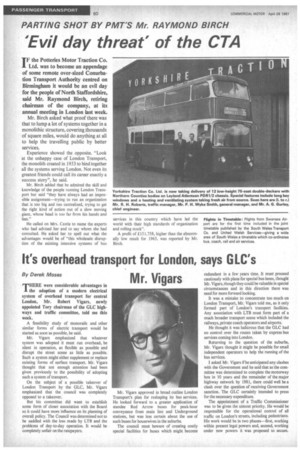It's overhead transport for London, says GLC's Mr. Vigars
Page 62

If you've noticed an error in this article please click here to report it so we can fix it.
By Derek Moses
THERE were considerable advantages In A the adoption of a modern electrical system of overhead transport for central London, Mr. Robert Vigars, newly appointed Tory chairman of the GLC highways and traffic committee, told me this week.
A feasibility study of monorails and other similar forms of electric transport would be started as soon as possible, he said.
Mr. Vigars emphasized that whatever system was adopted it must run overhead, be silent in operation, as flexible as possible and disrupt the street scene as little as possible. Such a system might either supplement or replace existing forms of surface transport. Mr. Vigars thought that not enough attention had been given previously to the possibility of adopting such a system of transport.
On the subject of a possible takeover of London Transport by the GLC, Mr. Vigars emphasized that the council was completely opposed to a takeover.
But his committee did want to establish some form of closer association with the Board so it could have more influence on its planning of overall policy. The Council was determined not to be saddled with the loss made by LTB and the problems of day-to-day operation. It would be completely unfair on the ratepayers. Mr. Vigars approved in broad outline London Transport's plan for reshaping its bus services. He looked forward to a greater application of standee Red Arrow buses for peak-hour conveyance from main line and Underground stations, but was less certain about the use of such buses for housewives in the suburbs.
The council must beware of creating costly special facilities for buses which might become redundant in a few years time. It must proceed cautiously with plans for special bus lanes, thought Mr. Vigars, though they could be valuable in special circumstances and in this direction there was need for more forward looking.
It was a mistake to concentrate too much on London Transport, Mr. Vigars told me, as it only formed part of London's transport facilities. Any association with LTB must form part of a much broader transport scene which included the railways, private coach operators and airports.
He thought it was ludicrous that the GLC had no control over the routes taken by express bus services coming into London.
Returning to the question of the suburbs, Mr. Vigars thought it might be possible for small independent operators to help the running of the bus services, I asked Mr. Vigars if he anticipated any clashes with the Government and he said that as the committee was determined to complete the motorway box in 10 years and the remainder of the major highway network by 1981, there could well be a clash over the question of receiving Government sanction. The GLC certainly intended to press for the necessary expenditure.
The appointment of a Traffic Commissioner was to be given the utmost priority. He would be responsible for the operational control of all traffic on London's streets, including pedestrians. His work would be in two phases—first, working within present legal powers and, second, working under new powers it was proposed to secure,
















































































































































































